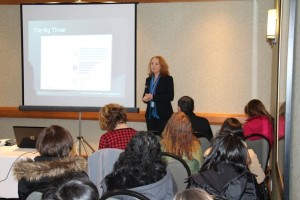Canadian employers emphasize in almost every job description their preference towards someone who is a ‘team player.’ As a result, these words were overused in job applications and ended up being listed as buzzwords in 2013. What can we do to avoid overusing certain buzzwords in our resumes or cover letters? The most common advise is to describe our abilities and skills through storytelling and accomplishment statements. Stories paint us in a unique way, they provide our reader with a cultural context and highlight whom we are both as professionals and as people.
At work, most teams are made of diverse people and these teams thrive through exposing new ideas, different views on facts, and through using good communication. Because good communicators know that differences can be explained and turned into new experiences. We are all born with this extraordinary ability to learn any culture and adapt to almost anything. We just need to stay open, observe our surroundings, and learn. As Henry Ford mentioned, “coming together is a beginning, staying together is progress, and working together is success”. For a team to be successful, its members would have to be able (and willing) to give and receive feedback in a comfortable environment, where they can communicate honestly and openly. Once in a new workplace, we should be open to learning, to understanding the dynamics of this new team. We should consider it an adventure of some kind, add to what we already know, build new experiences on previous ones, and we’ll get to a beautiful completion of the puzzle. A successful team player is focused on the next steps, on what was omitted, on what needs to be done to cover the gaps. By contrast, a nostalgic team member will normally focus on the past, which will hinder those much needed actions. An approach not always popular (as it’s not very inclusive) has divided teams into high performing and low performing (see Mark Murphy’s book Hiring for Attitude). 
Many have questioned if everything in building good teams comes down to leadership style? And many have agreed it does. An effective leadership will build collaboration and self-confidence through empowering its team members and through providing a healthy work environment. This may require professional development, team building activities, and communication training. Team building is normally regarded as a way of “growing together”, as a way of developing feelings of belonging.
How can someone new to a place learn more about its culture? Volunteer. Participate in various events. Conduct Informational Interviews. Make friends outside your family, circle, or community. Bristle at prejudices. People say it all the time, “it’s a Catch 22”: job seekers have a hard time to get that first job because of the lack of local work experience, which they can’t get because no employer gives them a chance. Yet everyone gets that first job, eventually. Some sooner, some latter. Some will move up fast, some will do it slowly, and some will just linger in there. It depends on how each individual career development strategy is built. If you don’t have one, it’s time to consider it. Your success comes down to preparation, commitment, and consistency. “Are you really ready?” Think about a combination of Canadian workplace culture knowledge + strong presentation skills + self-confidence + unpretentiousness. It is great if you bring strong technical skills + knowledge + intelligence, but this formula alone will not secure you what you want. In a job interview, 5 people have the exact same technical skills, and only one gets the job. The interview will primarily assess soft skills and your ability to fit with the existing team (a team you don’t know anything about). Go to the interview and prove the employer that you have done your part. Don’t sell them apples when they expect to buy oranges.
